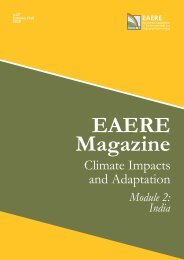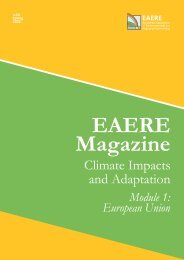EAERE Magazine - n.8 Winter 2020
You also want an ePaper? Increase the reach of your titles
YUMPU automatically turns print PDFs into web optimized ePapers that Google loves.
duction of the energy bill. The side effect<br />
of this political discourse is that most<br />
citizens get frustrated with the absence<br />
of political reaction to climate change,<br />
but at the same time strongly oppose any<br />
policy that would transparently require<br />
them to make sacrifices to their well-being.<br />
European governments and the European<br />
Union have not been inactive on the<br />
climate front. Ambitious emission norms<br />
have been enacted in the residential and<br />
transportation sectors. Incandescent bulbs<br />
have been eliminated. Very generous feedin-tariffs<br />
for PV panels and windmills have<br />
been installed to boost these renewable<br />
sources of energy. Bonus-malus systems<br />
in the automobile markets have incentivize<br />
consumers to purchase greener cars. Most<br />
of these climate micro-policies are vastly<br />
inefficient. They all face the “rebound<br />
effect”. They also often cost much more<br />
than the anticipated benefit, many policies<br />
costing more than 1000€ per ton of<br />
CO2 saved. The good thing is that these<br />
costs are often hidden, so that the political<br />
acceptability constraint is not a problem.<br />
Finally, these solutions are too narrow to<br />
efficiently contribute to the global solution.<br />
At the same time, coal could be replaced<br />
by natural gas which emits much less CO2<br />
per kWh produced. This would not cost<br />
more than 40 €/tCO2, but this obvious<br />
policy is not implemented. Germany<br />
has promised to exit from coal not later<br />
than 2038, and Poland continues to use<br />
coal to produce 80% of its electricity!<br />
Do economists have a science-based doctrine<br />
on this matter? In the face of this<br />
global failure to confront climate change<br />
over the last 30 years, the surprising<br />
answer to this question is a big “yes”. In<br />
the summer of 2019, the European Association<br />
of Environmental and Resource<br />
Economists published an “Economists’<br />
Statement on Carbon Pricing”. 1<br />
It has been<br />
the first time that the <strong>EAERE</strong> took an institutional<br />
position in the public debate.<br />
To my own surprise, I am not aware of<br />
any negative reaction, external or internal,<br />
to this break in our institution’s unwritten<br />
rule of policy neutrality. This echoes the<br />
initiative of the American-based Climate<br />
Leadership Council which published its<br />
own economists’ statement 2 in the Wall<br />
Street Journal on January 16, 2019. The<br />
<strong>EAERE</strong> statement is a European adaptation<br />
of this “Plan A”. It consists in implementing<br />
Arthur Pigou’s original idea 3 of<br />
1920 by correcting the mispricing of the<br />
climate externality through carbon pricing.<br />
By imposing the same price to any molecule<br />
of CO2 emitted on Earth that equals<br />
the marginal climate damage generated by<br />
this molecule, one realigns the myriad of<br />
private interests with the common good.<br />
Moreover, the universal price of carbon,<br />
with no exemption or reduced price, allocates<br />
the effort in a way that minimizes<br />
the global sacrifice for any given climate<br />
objective. All economists know that, and<br />
many teach this great policy recommendation<br />
in their ECON-101 course. The<br />
universal carbon price, growing over<br />
time, efficiently coordinates a degrowth<br />
movement, but only to the detriment<br />
of carbon-intensive goods and services.<br />
This consensus among economists is in<br />
striking contrast with the existing political<br />
chaos in this domain. It is right to say<br />
that economists have not been very efficient<br />
to promote their ideas in the past.<br />
They fought a lot about the choice of instruments<br />
(tax vs. permits), or about the<br />
level of the carbon price. They pinpointed<br />
complex obstacles, such as carbon leakages,<br />
the free-riding problem in international<br />
negotiations, the impact of carbon pricing<br />
on inequalities, and the long-term credibility<br />
of the policy. The leakage and free-riding<br />
problem can be solved by imposing<br />
carbon-linked border taxes, as claimed by<br />
the U.S. and <strong>EAERE</strong>’s statements. The<br />
inequality problem can be solved by the<br />
cleverly allocating part of the “carbon dividend”<br />
to the poorer deciles of the population.<br />
The long-term credibility issue can be<br />
solved by creating an independent “Carbon<br />
Central Bank” which would get the democratically-based<br />
mandate to reduce emission<br />
at a speed pre-defined by the citizens.<br />
<strong>EAERE</strong> and its recently created Policy<br />
Outreach Committee will be active in communicating<br />
on these issues in the coming<br />
months during which the new von Der<br />
Leyen Commission will shape its “Green<br />
Deal”. Given what is at stakes, from the<br />
destiny of Humanity on Earth to the jobs<br />
of Polish miners and the purchasing power<br />
7













